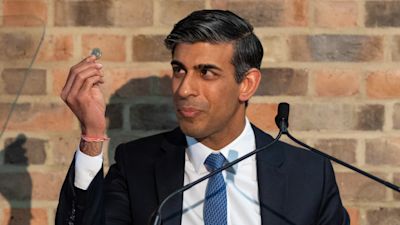'I don't judge people on how much is in their bank account': Sunak denies he's out of touch

The government wants the benefits of economic growth to be shared more evenly, the problem is, the economy has stopped growing, as Economics Editor Joel Hills reports
Inflation is high and rising, economic growth has stalled.
War in Europe has triggered a second wave of bruising food and energy price rises and further disrupted global supply chains.
In the UK, we face the biggest squeeze on our living standards in modern times.
Strong economic growth in January evaporated as Russian tanks moved into Ukraine. UK Gross Domestic Product (GDP) in February has been revised down to zero.
In March the economy contracted by 0.1% as manufacturing output slowed and consumers began to tighten belts.
“Our recovery is being disrupted by Putin’s barbaric invasion of Ukraine and other global challenges,” says the chancellor. “We are continuing to help people where we can."
The government is already providing £22 billion of support to households: alcohol duty has been frozen; fuel duty has been cut; the threshold above which employees pay National Insurance is being raised and up to £350 of support is on offer to deal with rising energy bills.
The headache for the chancellor is that, since these measures were announced, the outlook has darkened further.
A council tax rebate of £150 no longer looks as generous as it did. If the Bank of England is right then the average annual household energy bill will be £1,500 higher in October than it was at the time of the Spring Statement in March.
Inflation now looks headed for above 10% but benefits have risen by 3%. The worst of the cost-of-living crisis is yet to come and those on the lowest incomes face hardship.
Are we headed into another recession?
Without immediate extra support 250,000 households will “slide into debt and destitution”, says the National Institute for Economic and Social Research (NIESR).
“I’m not willing to let that happen,” Mr Sunak told me, hinting but not promising that more help may be forthcoming. “The biggest driver of future price rises will be the energy price cap in the autumn, we don’t yet know what that is”.
The NIESR wants the chancellor to temporarily increase Universal Credit by £25 week between May and October, supporting five million households at an estimated cost of £1.4 billion. The chancellor declined to say if he would do it, insisting that the changes to the taper rate he has already announced would “increase the generosity of Universal Credit…by £2 billion.”
Want a quick and expert briefing on the biggest news stories? Listen to our latest podcasts to find out What You Need To know...
Another much discussed idea is to tax the eye-popping profits of some the oil and gas producers and use the money to support those who are up against it. The chancellor’s thinking on this appears not to have changed. Two weeks ago, Rishi Sunak told Mumsnet a windfall tax is “something I would look at” unless the likes of BP and Shell could demonstrate they are reinvesting their profits “in our country and energy security”. This morning, he wouldn’t say how long he would give energy companies to prove they are doing this.
“I’m not naturally attracted to the idea of windfall taxes in general,” the chancellor said.
“I find there are are two camps of people. There’s a group of people who think you can never have a windfall tax and then there’s a group pf people who think they’re an easy answer to every problem. I’m not in either of those camps.”
Last night the boss of John Lewis urged the government to come up with a Covid-style cost of living aid package.
Dame Sharon White, a former second permanent secretary at the Treasury, told ITV’s Peson show that families were already struggling to pay food and energy bills and “the time has come for action”.
If the cavalry is coming, there’s little sign of it.
Mr Sunak is a fabulously wealthy man. There’s nothing wrong with that, but I asked the chancellor if he thought his wealth prevents him from connecting with the financial difficulties ordinary people face.
“Over the past two years I’ve done multiple things to support the economy and our country through some very difficult times. Actually, all the evidence shows that the people who benefited most from those interventions were people on lower and middle incomes.”
He added: “I tend not to judge people by how much is in their bank account, I judge them by their value and their actions. And I am proud of the record of this government and my record”.
Mr Sunak denies he is out of touch but it isn’t really clear why he is hesitant about offering further support immediately to those who are already struggling.
It is possible that he’s worried that he could make things worse.
Perhaps the chancellor is concerned that by shovelling sizeable sums of additional money into a constrained economy, he may inadvertently pour petrol on the flames - fuelling inflation rather than alleviating suffering.
If this is the case he didn’t say so. Some would consider it a legitimate concern.